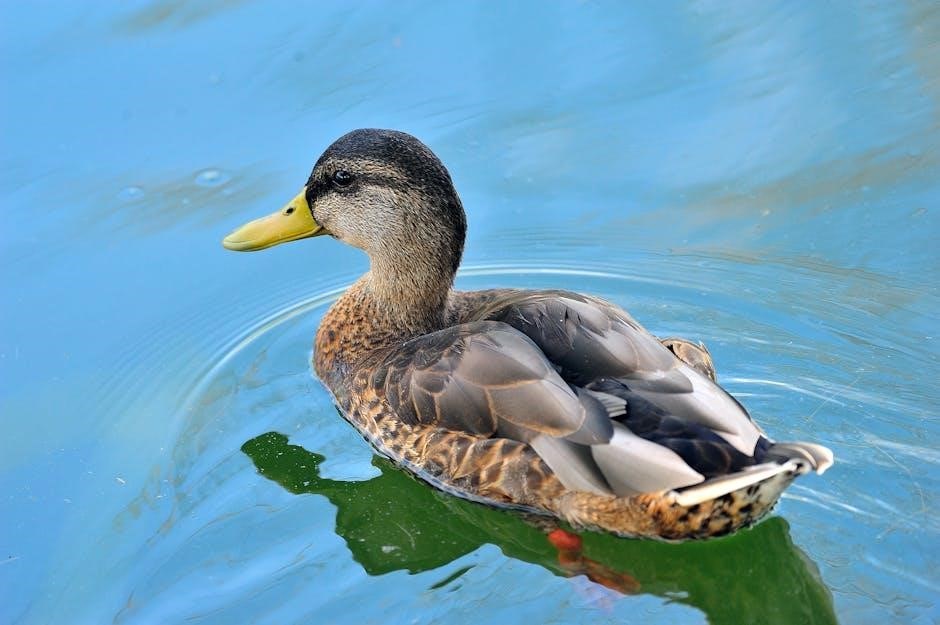Michigan offers exceptional duck hunting experiences, with its diverse waterfowl-rich regions attracting enthusiasts nationwide. Guides provide expert knowledge, ensuring successful and memorable hunts across the state’s pristine wetlands and waterways.
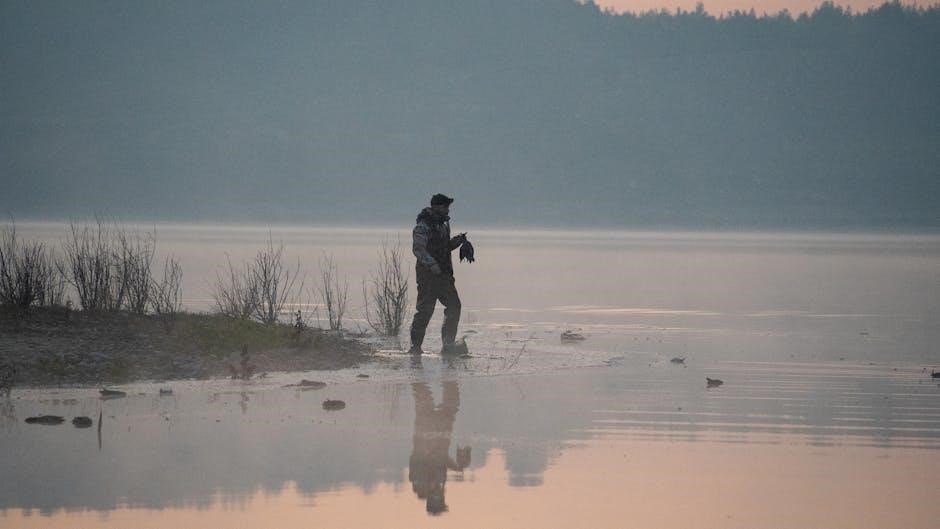
Licensing and Regulations
Michigan duck hunting requires a valid waterfowl license and federal duck stamp, issued by the Michigan DNR, ensuring compliance with seasonal bag limits and permits for sustainable hunting practices.
State Licensing Requirements
To hunt ducks in Michigan, you must obtain a valid Michigan waterfowl hunting license issued by the Michigan Department of Natural Resources (DNR). This license is required for both residents and non-residents and covers waterfowl hunting privileges. Additionally, a federal duck stamp is mandatory for hunters 16 years and older. The state also requires registration in the Harvest Information Program (HIP) for migratory bird hunting. Licenses can be purchased online or through authorized retailers, ensuring compliance with bag limits and season dates. Special permits may be needed for specific hunting locations or circumstances, such as controlled waterfowl hunting areas.
Federal Regulations and Stamps
Federal regulations require all waterfowl hunters, including those in Michigan, to obtain a Federal Duck Stamp. This stamp is mandatory for hunters 16 years and older and supports wetland conservation. Additionally, hunters must register with the Harvest Information Program (HIP) to track migratory bird harvests. Federal laws, governed by the Migratory Bird Treaty Act, set frameworks for season dates, bag limits, and shooting hours. These regulations are enforced nationwide, with state-specific adaptations. Ensure compliance by understanding flyway-specific rules, as Michigan falls under the Mississippi Flyway. Federal permits may also be required for certain hunting activities or locations. Always verify requirements before heading out.
Permits and Special Considerations
In addition to state licenses, Michigan duck hunters may need special permits for public lands or federal waterfowl refuges. Youth hunters under 16 must accompany licensed adults, while seniors may qualify for discounted licenses. Special permits are required for hunting on state game areas or national wildlife refuges. Conservation efforts, such as Habitat Stamps, support wetland preservation and may be mandatory for certain hunting locations. Ethical practices, like avoiding overharvest and respecting private property, are crucial. Always verify local regulations and obtain necessary permits before your hunt to ensure compliance and support conservation efforts. Check with the Michigan DNR for specific requirements.
Best Locations for Duck Hunting in Michigan
Michigan’s Upper and Lower Peninsulas offer prime duck hunting spots, with Saginaw Bay, Lake Erie, and the Great Lakes serving as hubs for waterfowl activity and abundant harvest opportunities.
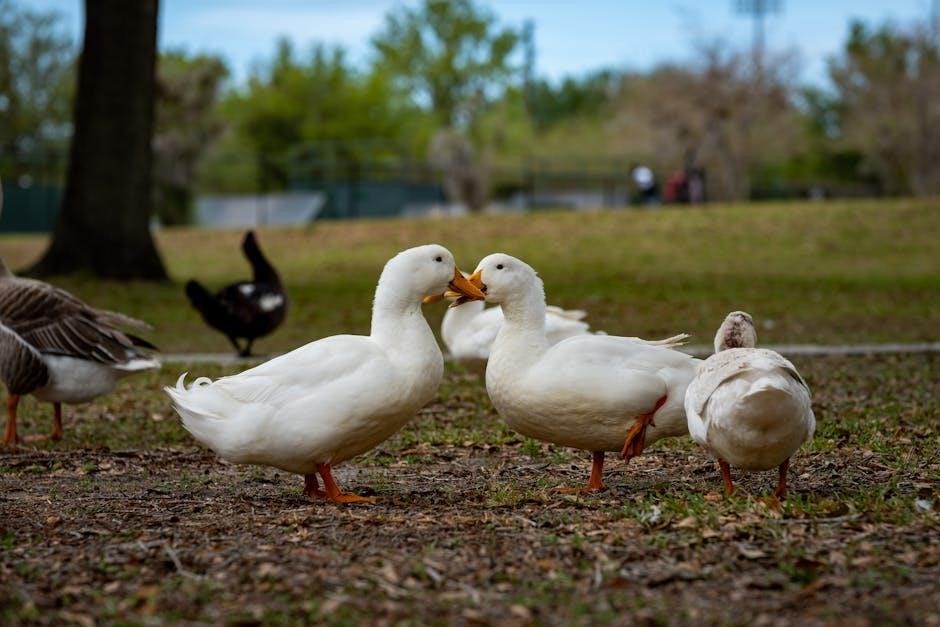
Key Regions: Upper vs. Lower Peninsula
Michigan’s Upper Peninsula (U.P.) and Lower Peninsula offer distinct duck hunting experiences. The U.P. is renowned for its remote, untouched wetlands and abundant wood duck populations, while the Lower Peninsula boasts hotspots like Saginaw Bay and Lake Erie, known for migratory waterfowl. The U.P. provides a tranquil, immersive hunting environment, ideal for those seeking solitude. In contrast, the Lower Peninsula’s diverse habitats, including marshes and agricultural fields, attract a wide variety of duck species, making it a favorite among both novice and experienced hunters. Each region offers unique opportunities, catering to different preferences and hunting styles.
Prime Hotspots and Waterfowl Areas
Michigan boasts numerous prime duck hunting hotspots, with Saginaw Bay and Lake Erie standing out as top destinations for migratory waterfowl. The Upper Peninsula’s vast wetlands are ideal for wood ducks, while the Lower Peninsula’s marshes and agricultural fields attract species like mallards and teal. Key waterfowl areas include the Detroit River, St. Clair Flats, and the Muskegon River, known for their abundant bird populations. Hunters often target these regions for their rich habitats and diverse species, making Michigan a premier destination for waterfowl enthusiasts seeking both challenge and success in the field.
Seasonal Timing and Weather Considerations
Michigan’s duck hunting season typically runs from early October to late December, with weather playing a crucial role in hunting success. Early-season hunters may face mild conditions, while late-season hunts demand resilience against cold and potential snow. The Upper Peninsula often experiences colder temperatures, whereas the Lower Peninsula sees more variable weather patterns. Hunters must adapt strategies based on these conditions, ensuring they scout effectively and monitor real-time weather forecasts. Staying informed about water levels and migratory patterns is essential for a productive and enjoyable hunting experience in Michigan’s diverse waterfowl habitats.

Essential Gear for Success
A reliable shotgun, appropriate ammunition, durable decoys, and effective camouflage are vital for a successful hunt, ensuring accuracy, effectiveness, and concealment in Michigan’s waterfowl habitats.
Firearms and Ammunition Choices
For duck hunting in Michigan, a reliable 12-gauge shotgun with a 3-inch chamber is ideal, offering sufficient range and power. Choke tubes, such as improved cylinder or modified, enhance shot patterns. Ammunition selection is critical, with steel shot being mandatory for waterfowl. BB or No. 2 shot excels for larger ducks, while No. 4 or 5 shot is effective for smaller species like teal. Always ensure compliance with federal regulations requiring non-toxic shot. Proper firearm maintenance and practice are essential for accuracy and ethical hunting. Choosing the right gear ensures a safe and successful hunting experience in Michigan’s diverse waterfowl habitats.
Decoys: Types and Strategies
Decoys are a cornerstone of successful duck hunting in Michigan, attracting birds with realistic designs and movements. Popular types include mallard, wood duck, and black duck decoys, which mimic the state’s common species. Motion decoys, such as spinning wing units, add dynamism to your spread. Use a mix of floating and field decoys to create a natural setup. Arrange them in feeding patterns or small groups to appear lifelike. Visibility from a distance is key, so place decoys in open water or fields. Avoid overcrowding, as sparse arrangements often work best. These strategies enhance your chances of luring ducks effectively in Michigan’s diverse waterfowl habitats.
Clothing and Camouflage Needs
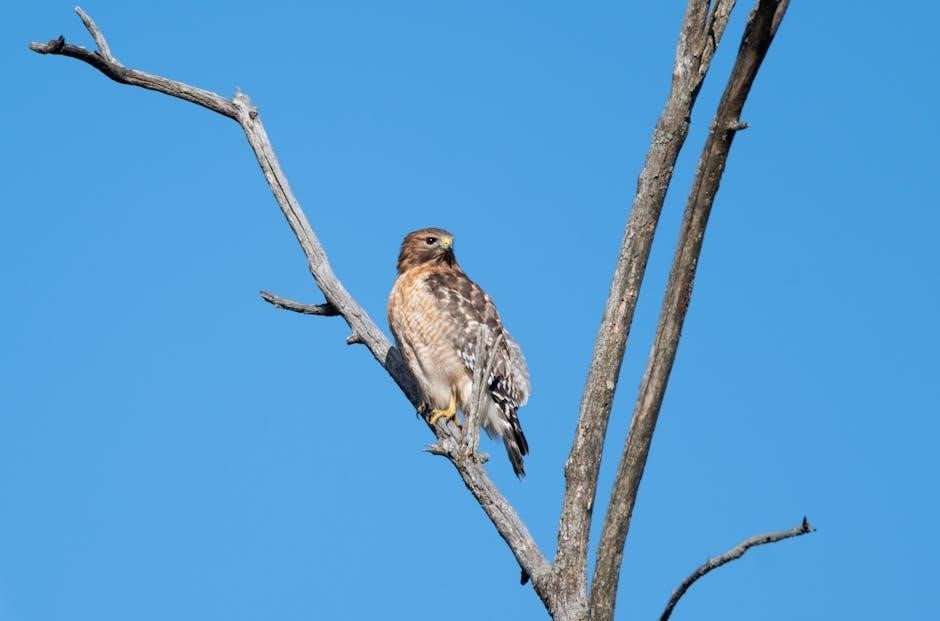
Proper clothing and camouflage are essential for a successful Michigan duck hunt. Hunters should wear layers of breathable, waterproof gear, such as jackets and pants made from materials like Gore-Tex, to withstand cold, wet conditions. Earth-toned camouflage patterns, including marsh grass and woodland designs, help blend into the environment. A face mask and gloves are crucial to conceal skin tones, while a hat completes the outfit. Avoid bright colors to remain unnoticed by ducks. Layering allows adjustment for varying temperatures, ensuring comfort during long hours in the field. The right attire enhances concealment and endurance for a productive hunting experience in Michigan’s diverse habitats.
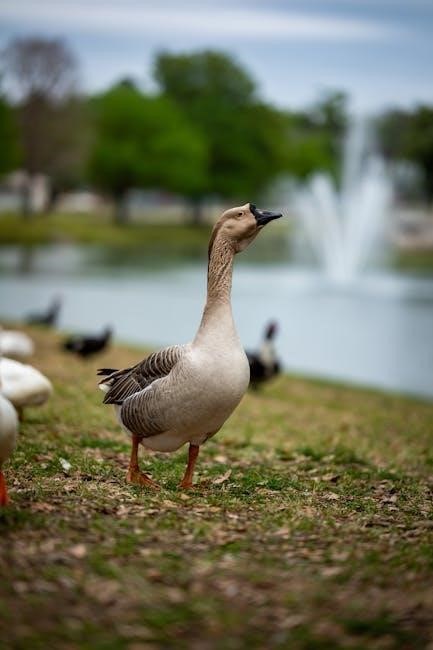
Hunting Strategies and Techniques
Effective strategies and techniques are crucial for successful duck hunting in Michigan. Experienced guides often emphasize scouting, timing, and calling to maximize results, ensuring a memorable hunt.
Scouting for Optimal Locations
Scouting is essential for identifying prime duck habitats and patterns in Michigan. Guides often survey wetlands, marshes, and waterfowl zones to locate concentrations of ducks. By observing bird movements and feeding areas, they map ideal hunting spots. Timing is critical, as scouting before and during the season helps adapt to changing duck behaviors. This preparation ensures hunters are positioned in high-activity zones, maximizing success rates. Experienced guides leverage their knowledge of Michigan’s flyways and seasonal migrations to pinpoint the best locations, making the hunt both efficient and rewarding.
Effective Duck Calling Techniques
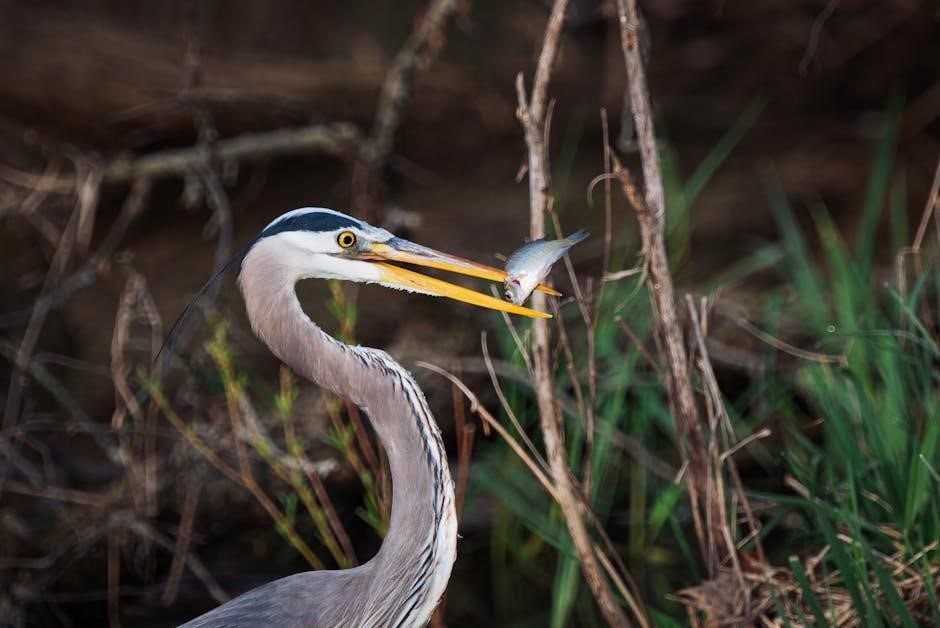
Mastering duck calling is a cornerstone of successful waterfowl hunting in Michigan. Guides emphasize the importance of realistic and timely calls to attract ducks. The mallard hen call is a staple, while high balls and feeding chuckles can entice birds during different phases of the hunt. Overcalling is a common mistake, so restraint and natural pacing are key. Experienced guides teach hunters how to mimic the sounds of various duck species, ensuring the calls blend seamlessly with the environment. Proper technique, combined with patience, enhances the likelihood of luring ducks within range, making the hunt both thrilling and productive.
Setting Up Decoys Effectively
Setting up decoys effectively is crucial for a successful duck hunt in Michigan. Guides recommend using a mix of species-specific decoys, such as mallards and wood ducks, to create a natural appearance. Place decoys in open water areas, arranging them in small groups to mimic feeding or resting ducks. Adding motion decoys or spinners can attract birds from a distance. Ensure the spread is visible from multiple angles and aligns with the wind direction to create realistic movement. Guides often teach hunters how to adjust decoy placement based on weather conditions and duck behavior, ensuring the setup looks authentic and inviting to waterfowl.
Identifying Duck Species in Michigan
Michigan is home to a diverse range of duck species, including wood ducks, mallards, and mergansers. Identifying these species requires understanding their unique physical traits, such as plumage, beak shape, and size. Wood ducks are known for their vibrant colors, while mergansers have distinctive sawbill-shaped beaks. Seasonal variations in plumage and behavior also play a role in identification. Hunters must accurately identify species to comply with regulations, as bag limits and legal species vary. Guides often provide expertise in recognizing waterfowl, ensuring hunters can distinguish between species effectively during their outings.
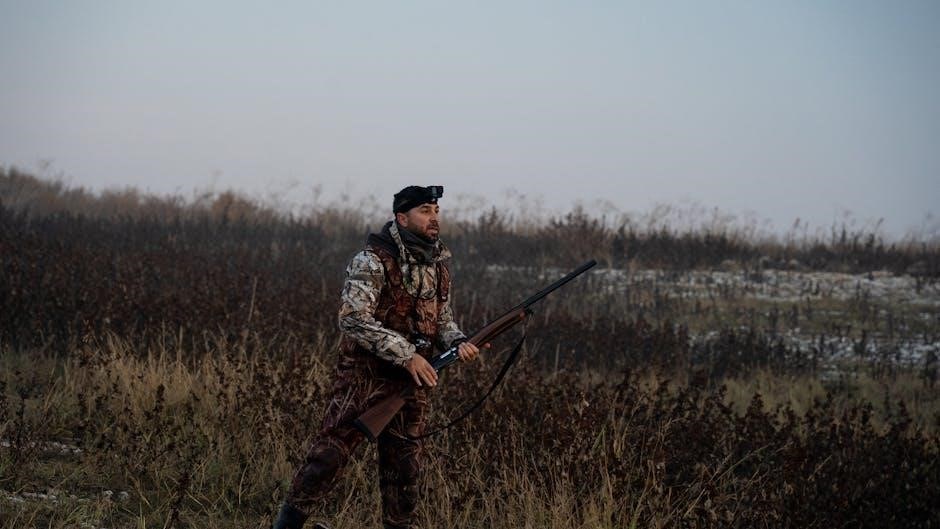
Guided Tours and Outfitters
Michigan duck hunting guides and outfitters offer expert-led tours tailored to both novice and experienced hunters. These professionals provide invaluable local knowledge, ensuring access to prime hunting locations and maximizing success. Many outfitters supply essential gear, including decoys, blinds, and boats, while sharing proven strategies for attracting waterfowl. Guided tours often include scouting services, enabling hunters to locate active flight paths and feeding areas. By leveraging their expertise, hunters can focus on refining their skills and enjoying a memorable experience. These services are particularly beneficial for those unfamiliar with Michigan’s diverse waterfowl habitats and seasonal patterns.
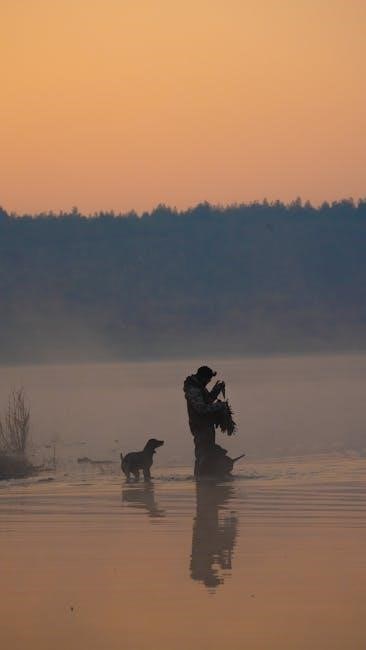
Safety and Ethical Hunting Practices
Safety and ethical practices are cornerstone principles for Michigan duck hunters. Always wear appropriate safety gear, including life jackets and blaze orange, to ensure visibility and protection. Respect wildlife habitats by minimizing environmental impact and avoiding sensitive areas. Adhere strictly to bag limits and season regulations to maintain sustainable populations. Ensure humane treatment of harvested birds and avoid wasteful practices. Firearms should be handled with care, following all safety protocols. Ethical hunting promotes conservation and responsible stewardship of natural resources, ensuring the sport remains viable for future generations. Prioritize respect for nature, fellow hunters, and local regulations.
Local Resources and Community
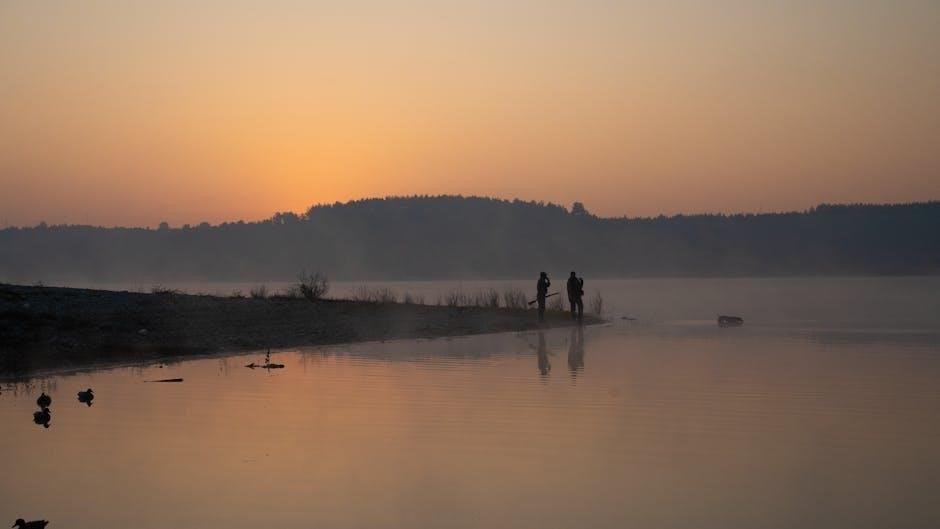
Michigan’s vibrant hunting community offers extensive local resources to support duck hunters. The Michigan Department of Natural Resources (DNR) provides detailed guides, season updates, and license information. Conservation organizations like Ducks Unlimited actively work to protect habitats and offer educational programs. Local hunting clubs, forums, and events foster camaraderie and knowledge sharing among enthusiasts. Many communities host workshops on waterfowl identification, ethical practices, and gear maintenance. These resources not only enhance the hunting experience but also promote sustainable conservation efforts, ensuring Michigan remains a premier destination for duck hunting while preserving its natural heritage for future generations.
Michigan duck hunting guides offer a comprehensive and enriching experience, combining expert knowledge with the state’s abundant waterfowl resources. From scouting prime locations to mastering calling techniques, these guides ensure a memorable hunt. The community’s dedication to conservation and ethical practices highlights Michigan’s commitment to sustainable hunting. Whether you’re a seasoned hunter or a beginner, the combination of skilled guides, stunning landscapes, and vibrant wildlife makes Michigan a standout destination for duck hunting. This guide has provided the tools and insights needed to plan and execute a successful hunt, ensuring lasting memories in Michigan’s outdoor paradise.
